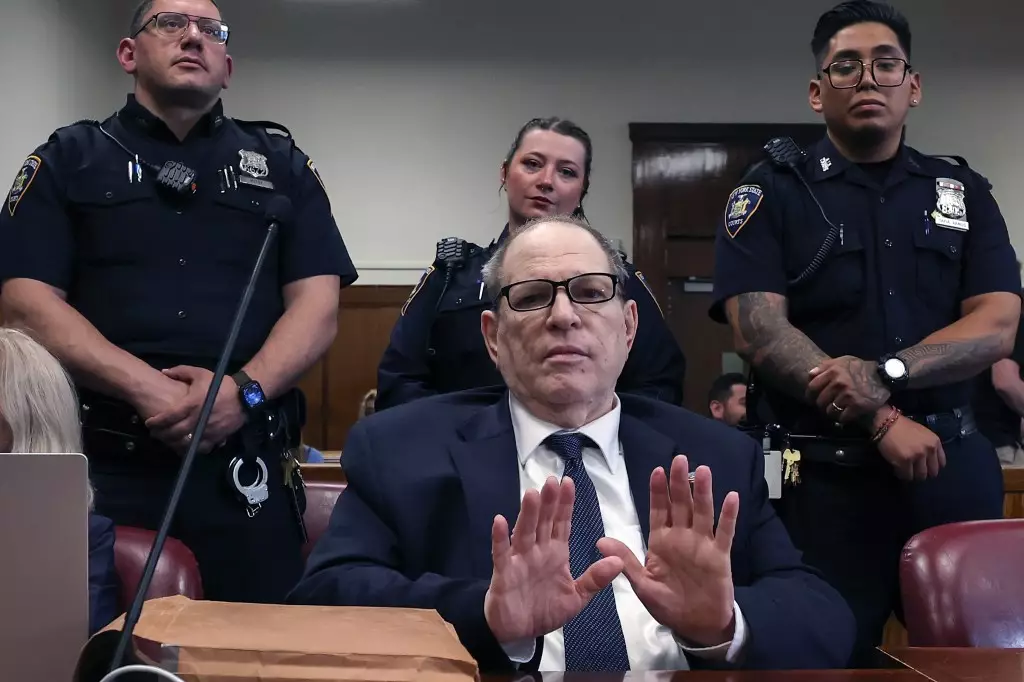Harvey Weinstein, once a titan in the film industry, has become a central figure in a scandal that reshaped societal norms regarding sexual misconduct. As he navigates the complexities of his New York rape retrial, his legal team’s decision not to allow him to testify raises significant questions. Unlike previous trials where he expressed a desire to share his side of the story, this time, it appears that silence may be his best tactic. His spokesperson, Juda Engelmayer, recently illustrated that caution has taken precedence over a rebuttal. “At this stage, doing so would subject him to scrutiny far beyond the scope of the current charges,” he stated, suggesting that Weinstein’s team is acutely aware of the heightened stakes involved in court proceedings, particularly in a climate where public sentiment about sexual predators has shifted dramatically since the onset of the #MeToo movement.
Critics might view this decision as a dereliction of responsibility, prompting outrage that he feels he can sidestep the court’s accountability. But it also reflects an understanding of the complicated multifaceted nature of sexual assault cases today, where mere allegations can carry a burden heavier than a formal conviction. This strategic silence could be viewed as a recognition of the potential pitfalls—a calculated move to protect his credibility rather than a mere act of evasion.
Guerilla PR: A Defensive Offensive
Interestingly, while Weinstein’s position in the courtroom remains mute, he has not shisshed his narrative beyond its legal boundaries. Engaging in a guerrilla PR campaign, he recently shared his perspectives in a jailhouse interview with controversial commentator Candace Owens. His statements professing innocence have not only muddied public discourse around his culpability but also elicited varying responses from audiences who are polarized on issues of justice, power, and privilege. By proclaiming, “I swear that before God… I’m wrongfully accused,” Weinstein attempts to align himself with universal themes of morality and fairness, deliberately jostling with perceptions of innocence and guilt amid an emotionally charged societal backdrop.
Weinstein’s comments, articulated as a desperate plea, nevertheless tap into a broader narrative of accountability that this generation demands. Whether employing a savvy public relations tactic or genuinely expressing his frustration about the judicial process, his words echo the frustrations of many who feel that societal changes are sometimes misapplied in individual cases. The timing of his interview, particularly juxtaposed against the ongoing courtroom drama, sheds light on his understanding of public relations: one that he may have mastered during his Hollywood reign but is now forced to wield in a context stripped of glamour.
The Defense Strategy: Shifting the Narrative
Weinstein’s defense is grounded in the assertion that relationships with his accusers were consensual—referred to as “friends with benefits” arrangements. This separation of relationships from criminality is not just a legal maneuver but a reflection of shifting societal norms and expectations around gender dynamics and consent. Defense attorney Arthur Aidala’s framing pushes against societal tides that at this critical moment assert a more uncompromising definition of consent.
This strategy might be interpreted as an affront to the victims’ narratives, and yet, it raises ethical questions: How do we balance individual rights against cultural movements focused on accountability? By exploring themes of mutual consent, the defense aims to redefine the conversation surrounding these accusations, transforming them from inherently predatory encounters into complicated, even if regrettable, interactions.
The Inevitable Consequences
As Weinstein’s retrial progresses, the backdrop of global #MeToo awareness looms large. The implications extend beyond his case, reflecting cultural transformations that are redefining norms and expectations around gender and power imbalance. If he is found guilty once more, the long-term ramifications could see him not only facing life behind bars but also potentially serving as a case study for future discourse around accountability in Hollywood and beyond.
Although Weinstein maintains a veneer of bravado through public statements and PR strategies, the reality is harsher than any carefully scripted narrative. As a figure who once exuded control over both his career and the lives of countless individuals, he now contends with the possibility of an inescapable legacy marked by scandal and disgrace. The courtroom, rather than the red carpet, has become the stage on which his true character is examined, and the verdict of both the jury and broad societal perception will ultimately determine his fate.

